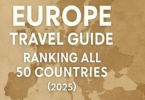Traveling the world doesn’t have to be a luxury reserved for the rich. With the right approach and a few smart strategies, anyone can enjoy incredible experiences without spending a fortune. Whether you’re a student, a young professional, or someone simply looking to make your money stretch further, this Budget Travel Guide Tips article will walk you through everything you need to know to travel affordably — from planning and transportation to food, accommodation, and more.
1. Plan Ahead — But Stay Flexible

One of the biggest secrets to successful budget travel is planning ahead. Researching destinations, comparing prices, and creating a general itinerary will save you both time and money. However, flexibility often leads to the best deals.
How to Plan Smartly:
- Use flight comparison websites such as Google Flights, Skyscanner, or Momondo to find cheap flights.
- Sign up for price alerts to monitor fluctuations in airfare.
- Be flexible with travel dates and destinations. For example, flying on a Tuesday instead of a Friday can sometimes save you hundreds of dollars.
- Look into off-season travel. Visiting a destination during its low season can dramatically cut costs on flights and accommodations while avoiding tourist crowds.
Tip: Avoid last-minute bookings unless you’re specifically looking for flash deals or last-minute discounts.
2. Choose Budget-Friendly Accommodation
Accommodation is often one of the largest travel expenses, but it’s also one of the easiest areas to save money.
Options to Consider:
- Hostels: Great for solo travelers or backpackers. Many now offer private rooms with affordable prices.
- Guesthouses and Homestays: Offer authentic local experiences, often with homemade meals included.
- Short-Term Rentals (Airbnb, Booking.com): Ideal for groups or long stays. You can often find entire apartments cheaper than hotels.
- Couchsurfing: A platform where locals offer free places to stay. Perfect for adventurous travelers looking to connect with locals.
- House Sitting: Watch someone’s home (and sometimes pets) while they’re away, in exchange for free accommodation.
Tip: Always read recent reviews before booking to ensure safety, cleanliness, and reliability.
3. Eat Like a Local
Dining out can quickly drain your travel budget, especially in tourist-heavy areas. Eating like a local is not only cheaper but often gives you a more authentic experience.
Ways to Save on Food:
- Visit local markets or street food vendors. Local dishes are usually cheaper and freshly prepared.
- Cook your own meals if your accommodation has a kitchen. Buying groceries can be a fraction of the cost of eating out daily.
- Avoid tourist restaurants. Restaurants near major attractions tend to have inflated prices. Walk a few blocks away for better prices and more authentic food.
- Carry snacks for long bus or train rides to avoid overpriced options at rest stops or airports.
Example: In Thailand, you can enjoy a filling plate of Pad Thai from a street vendor for around $1–2, while a restaurant near tourist attractions might charge five times as much for the same meal.
4. Use Public Transportation or Walk
Transportation costs can add up quickly, especially if you rely on taxis or private transfers.
Cost-Saving Transportation Ideas:
- Public transport (buses, trains, trams, or metros) is almost always cheaper than taxis.
- Many cities offer travel passes or day cards that allow unlimited rides for a fixed price.
- Walking is free and often the best way to explore neighborhoods and hidden spots that tourists miss.
- In some destinations, bike rentals or shared scooters are affordable alternatives.
Tip: Download offline map apps like Google Maps or Maps.me to help you navigate without using mobile data.
5. Look for Free or Low-Cost Attractions
You don’t have to spend a lot of money to have fun while traveling. Most destinations have plenty of free or low-cost attractions.
Examples Include:
- Public parks and gardens
- Free walking tours offered by locals
- Museums with free admission days or discounted tickets
- Local festivals, cultural events, and street performances
- Historic landmarks and natural attractions
Before you go, research “free things to do in [your destination]” — you’ll likely find a long list of great activities.
6. Be Smart With Money
Handling money wisely while traveling is an essential part of any budget travel guide.
Tips for Managing Money Abroad:
- Use credit cards that don’t charge foreign transaction fees.
- Withdraw cash in larger amounts to minimize ATM fees.
- Always pay in local currency when given the option — paying in your home currency often includes hidden conversion fees.
- Track your expenses using a budgeting app like Trail Wallet or Mint.
Keeping a daily spending limit helps you control costs and avoid running out of money halfway through your trip.
7. Stay Connected Affordably
Communication is vital while traveling, but international roaming can be expensive.
Affordable Connectivity Options:
- Purchase a local SIM card upon arrival — usually cheaper than roaming.
- Use eSIM services like Airalo or Holafly if your phone supports them.
- Take advantage of free Wi-Fi in cafes, libraries, airports, and public spaces.
- Use apps like WhatsApp, Telegram, or Skype for free messaging and calls over Wi-Fi.
8. Travel Light
Packing efficiently not only makes your trip easier but can also save you money on baggage fees.
How to Pack Smart:
- Stick to a carry-on bag to avoid checked baggage charges.
- Choose versatile clothing that can be mixed and matched.
- Bring reusable items like water bottles and utensils to cut down on small daily expenses.
- Keep essential travel documents, chargers, and medication in your personal bag.
Light packing means more freedom to move around, especially when using public transportation.
9. Connect With Other Travelers
One of the joys of budget travel is meeting like-minded people along the way. Connecting with other travelers can lead to shared experiences and cost-saving opportunities.
Ways to Meet Travelers:
- Stay in hostels with communal spaces.
- Join online groups or forums such as Facebook travel communities or Reddit’s r/travel.
- Attend local meetups, group tours, or free walking tours.
Traveling with others can help you split costs for transportation, accommodation, or meals.
10. Focus on the Experience, Not the Expense
Budget travel isn’t about being cheap — it’s about being resourceful. The goal is to make your money go further while still enjoying rich experiences. Often, traveling on a budget allows for deeper cultural immersion because you interact more with locals and experience destinations beyond the typical tourist path.
You may also like to read these posts:
Travel Guide for Beginners: Your Complete Step-by-Step Guide to Starting Your Journey
Best Travel Guides 2026: Your Complete Companion for Smarter and More Meaningful Travel
Europe Travel Guide for Tourists: Everything You Need to Know Before Exploring the Continent
Asia Travel Guide for Visitors: A Complete and Friendly Guide to Exploring the Continent
Benefits of Budget Travel

- Affordability: You can explore more destinations without financial strain.
- Authentic Experiences: Budget travelers often interact more with locals, leading to genuine cultural exchanges.
- Flexibility: Traveling light and spending less allows you to change plans easily.
- Personal Growth: Managing limited resources builds problem-solving skills and confidence.
- Sustainability: Budget travel tends to be more eco-friendly, as it often involves public transport and local businesses rather than large resorts.
Drawbacks of Budget Travel
- Comfort Limitations: Budget accommodations or long public transport rides can be less comfortable.
- Time-Consuming: Searching for the cheapest options can take time and effort.
- Limited Access to Luxuries: You might miss out on certain experiences like fine dining or premium excursions.
- Potential Risks: Extremely low-cost options can sometimes compromise safety or quality if not researched properly.
- Unpredictability: Budget travel often involves flexibility, which can lead to last-minute changes or inconveniences.
Final Thoughts
Budget travel is not about depriving yourself — it’s about being smart, intentional, and creative with your choices. By following these budget travel guide tips, you can make your money stretch further while still creating unforgettable memories.
Traveling on a budget encourages you to experience the world through a more authentic lens — connecting with people, exploring hidden gems, and appreciating the simple joys of discovery. With planning, flexibility, and the right mindset, you’ll realize that the best adventures often come from the most unexpected — and affordable — places.
FAQS
1. What is budget travel?
Budget travel means exploring destinations while keeping your expenses as low as possible without sacrificing the quality of your experience. It involves smart planning — like choosing affordable transportation, staying in budget-friendly accommodations, eating local food, and finding free or low-cost attractions. The focus is on experiencing more while spending less.
2. How do I plan a budget-friendly trip?
Start by setting a clear travel budget. Then, research destinations that fit your price range. Look for affordable flight deals, compare accommodation options, and plan your itinerary around free or inexpensive attractions. Using tools like Google Flights, Hostelworld, and Skyscanner can help you find the best deals.
3. What are the best destinations for budget travelers?
Some of the most popular budget travel destinations include:
Thailand – Affordable food, transportation, and accommodations.
Vietnam – Rich culture and low living costs.
Portugal – A budget-friendly option in Western Europe.
Mexico – Great for cheap eats and diverse travel experiences.
India – Excellent for low-cost cultural and historical adventures.
4. Is it safe to travel on a budget?
Yes, budget travel can be safe if you plan carefully. Always read reviews before booking accommodations or tours, keep your belongings secure, and stay alert in crowded areas. Avoid deals that seem too good to be true and research local scams in your destination beforehand.
5. How can I save money on flights?
Here are a few proven ways to find cheap flights:
Be flexible with your travel dates and destinations.
Use price comparison websites like Skyscanner or Google Flights.
Book flights 2–3 months in advance for the best deals.
Fly mid-week instead of weekends.






